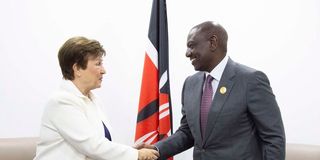IMF: Kenya on the right path on management of fuel subsidies

President William Ruto during a meeting with the International Monetary Fund Managing Director Kristalina Georgieva in Sharma El-Sheikh, Egypt.
The International Monetary Fund (IMF) now says Kenya is on the right path in management of fuel subsidies despite having failed to meet its self-prescribed sunset dates for doing away with the subsidies.
In the July 2022 third review of the ongoing $2.41 billion programme with the fund, the government had set October 31, 2022 as the sunset date for fuel subsidies before revising it to December 31, 2022 during the fourth review.
“The authorities intend to continue gradually realigning domestic to global fuel prices in FY2022/23 so as to eliminate the fuel subsidy by October 2022”, said the fund’s third review report before being revised to, “The authorities plan to fully eliminate fuel subsidies by end-year."
In the Supplementary Budget I for 2022/23, the Ministry of Petroleum's was revised upward from Sh24.65 billion to Sh66.39 billion with the bulk of this increase earmarked for settlement of fuel subsidy arrears.
The IMF now says that inclusion of subsidy expenses in budget appropriation and creation of visibility on the expenses is as much as it demands from governments as opposed to sunset dates.
“What we ask and I think what is most important is that the cost of these subsidies is included in the regular appropriation process rather than being left as a contingent liability and off-balance sheet. This allows clarity on the trade-offs that the government is making. So, with Kenya what we are asking is that the subsidies be put on budget and it be transparent”, says IMF’s Director for the Africa Department, Abebe Selassie.
The IMF, however, maintains that by and large fuel subsidies are a wasteful expenditure which have benefits skewed in favour of those who least merit cushioning from the state.
In the April 14, 2023 pump price review, the government has maintained subsidy on Kerosene at Sh17.12 per litre.
“Our general approach is to flag that this tends to be a regressive use of government spending in many countries. Regressive meaning that the benefits of such subsidies tend to accrue to the richer segments of societies more than the poor segments.
"In a world where we still have elevated levels of poverty, we are not sure that this is the best use of resources and then we leave it to the government to decide whether to sustain those policies or remove them”, Abebe says.





